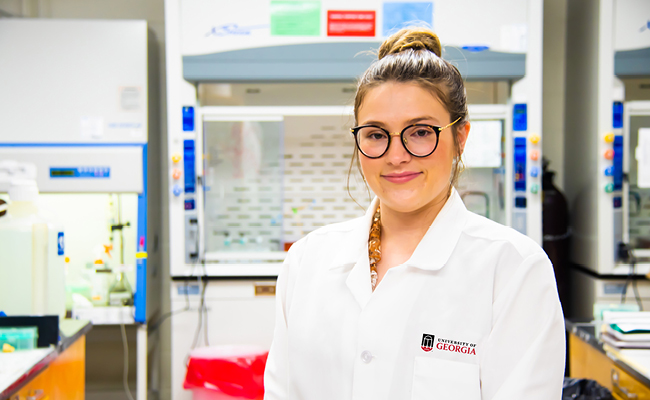
Megan Douglass
Megan Douglass, a graduate student in the University of Georgia College of Engineering, has received a 2020 Baxter Young Investigator Award for her research on next-generation medical devices that mitigate infection in hospital settings.
Douglass, who is pursuing her doctorate in engineering with a biomedical emphasis, is one of 16 recipients of the award. Sponsored by health care product company Baxter International, Young Investigator Awards are designed to stimulate and reward research applicable to the development of therapies and medical products that help resolve critical needs. The awards are open to graduate students and postdoctoral fellows.
Working in Associate Professor Hitesh Handa’s laboratory, Douglass is designing and evaluating antimicrobial and blood-compatible surfaces to reduce the rate of infection and clotting related to medical device use.
“The majority of urinary tract infections, bloodstream infections, and pneumonia cases developed by critically ill patients are directly related to medical devices including urinary catheters, vascular catheters, and ventilators,” said Douglass. “In already health-compromised patients, infection can severely impact the rate of recovery and survival.”
Although medical devices have revolutionized the diagnosis, mitigation, and treatment of diseases, Douglass notes infection and device clotting remain significant problems.
“When a patient comes into a hospital, the last concern he or she should have is developing additional ailments that can complicate treatment or recovery. Our goal is to eliminate the risk of infection and device clotting, improving patient outcome.”
One of the most promising breakthroughs in Douglass’ research involves the combination of copper nanoparticles with nitric oxide-releasing technology, creating a multifunctional antibacterial and antithrombotic platform for medical device coatings. In a study published in ACS Applied Bio Materials, Douglass and her fellow researchers demonstrated the effectiveness of this one-two punch against two common strains of bacteria related to hospital acquired infections, Staphylococcus aureus and Pseudomonas aeruginosa. The researchers also evaluated the materials’ ability to prevent clotting in an extracorporeal circuit rabbit model, similar to the devices used for dialysis and cardiopulmonary bypass.
Handa, her major professor, describes Douglass as an ideal graduate student: extremely hard-working, detail-oriented, and highly organized.
“Her attitude has always been how can I learn more and how can I improve myself,” said Handa. “She is a great team player, always helpful and easy to communicate with. She is basically everyone’s go-to person in the lab.”
Douglass wants to work as a research and development engineer for a medical device company after earning her Ph.D.
“After learning that I was selected for the award, I was very thankful for the recognition,” said Douglass. “Baxter’s goal to improve patient outcome by continuously designing, adapting, and developing medical devices is directly aligned with my research goals, which makes this award a great honor.”

